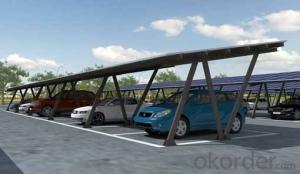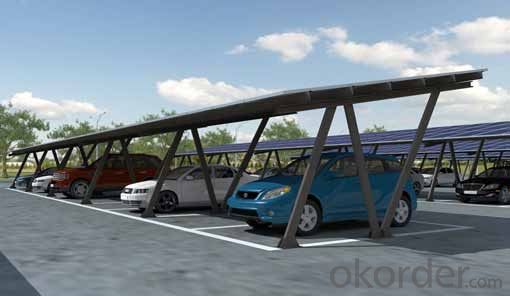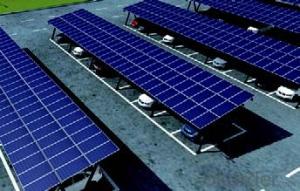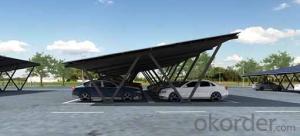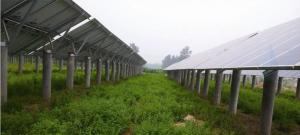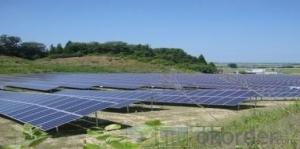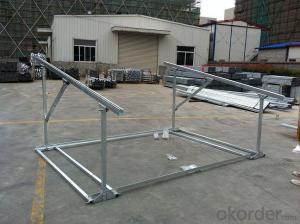Florida Solar Energy Systems Solar Mounting Carport System
- Loading Port:
- China Main Port
- Payment Terms:
- TT OR LC
- Min Order Qty:
- -
- Supply Capability:
- -
OKorder Service Pledge
Quality Product, Order Online Tracking, Timely Delivery
OKorder Financial Service
Credit Rating, Credit Services, Credit Purchasing
You Might Also Like
Product Features
• No location limitation
• Simple structure, easy & quick installation
• Use standard components, low maintenance cost
• Easy to be packaged, minimized transportation cost
• Removable & reusable
• With waterproof & non-water proof solutions for choice
• Customization available
- Q: Can solar energy systems be used for powering farms?
- Yes, solar energy systems can definitely be used for powering farms. In fact, solar power is increasingly being adopted by farmers worldwide as a sustainable and cost-effective alternative to traditional forms of energy. Solar panels can be installed on the roofs of barns and other farm buildings or on ground-mounted systems, generating electricity from the sun's energy. This clean, renewable energy can then be used to power various farming operations, such as irrigation, lighting, ventilation, and machinery. Solar energy systems can significantly reduce farmers' reliance on fossil fuels and save them money on electricity bills in the long run. Additionally, solar power systems can be combined with energy storage solutions, such as batteries, to ensure a continuous power supply even during periods of low sunlight. By harnessing the power of the sun, farmers can not only reduce their environmental impact but also improve the sustainability and efficiency of their operations.
- Q: How does the angle of a solar panel affect its performance in different seasons?
- The angle of a solar panel significantly affects its performance in different seasons. In summer, when the sun is higher in the sky, it is best to tilt the solar panel at a steeper angle to maximize sunlight absorption. This allows the panel to capture more direct sunlight and generate more electricity. In contrast, during winter when the sun is lower, it is optimal to tilt the solar panel at a shallower angle to accommodate for the lower sun angle. Adjusting the angle of the solar panel according to the season helps optimize its performance and ensures maximum energy production throughout the year.
- Q: Can solar energy systems be used in areas with limited access to storage solutions?
- Yes, solar energy systems can be used in areas with limited access to storage solutions. In such cases, solar energy can be utilized directly as it is generated during daylight hours, without the need for storage. This is particularly beneficial in regions with abundant sunlight, where solar power can provide a reliable and sustainable source of electricity during daylight hours, reducing the reliance on traditional energy sources and minimizing the need for storage solutions.
- Q: Are solar energy systems expensive to install?
- Solar energy systems can be expensive to install initially, but they offer long-term benefits and savings on energy bills. The cost of installation depends on various factors such as the size of the system, location, and available incentives. However, with the decreasing cost of solar technology and potential for government incentives, the overall cost has become more affordable in recent years. Additionally, considering the long lifespan and the potential to sell excess energy back to the grid, solar energy systems can be a wise investment in the long run.
- Q: Can solar energy systems be used in areas with limited access to solar mounting systems?
- Yes, solar energy systems can still be used in areas with limited access to solar mounting systems. In such cases, alternative solutions like ground-mounted systems, solar canopies, or even portable solar systems can be utilized to harness solar energy effectively. These options provide flexibility in installation and can be adapted to various landscapes, making solar energy accessible even in areas with limited access to traditional solar mounting systems.
- Q: How do solar energy systems affect wildlife?
- Solar energy systems can have both positive and negative effects on wildlife. On one hand, they provide renewable and clean energy, reducing greenhouse gas emissions and mitigating climate change's impact on habitats. On the other hand, the installation and operation of solar panels can disrupt or displace wildlife, particularly during construction and land clearing. However, with proper planning and design, solar energy systems can incorporate wildlife-friendly measures like habitat restoration and wildlife corridors, minimizing negative impacts and even creating new opportunities for biodiversity.
- Q: Are there any risks of electrical hazards during installation or maintenance of solar energy systems?
- Yes, there are risks of electrical hazards during the installation or maintenance of solar energy systems. Solar energy systems involve working with high-voltage DC (direct current) electricity, which can pose dangers if not handled properly. Some of the potential risks include: 1. Electrocution: Solar panels generate electricity, and if not isolated or disconnected properly, there is a risk of electrocution for individuals working on the system. 2. Fire Hazards: Faulty wiring, loose connections, or improper installation can lead to electrical arcs and sparks, which can ignite a fire if proper precautions are not taken. 3. Falls and Injuries: Solar panels are typically installed on rooftops, which may involve climbing ladders, working at heights, and handling heavy equipment. If not done with caution, it can result in slips, falls, or injuries. 4. Arc Flash: When working on live electrical equipment, there is a risk of arc flash, which is a sudden release of energy that can cause severe burns, hearing damage, and even death. 5. Environmental Risks: While not directly related to electrical hazards, it is essential to consider potential environmental risks during the installation of solar energy systems. For instance, improper disposal of hazardous materials used in solar panels, such as lead, cadmium, or other toxic substances, can harm the environment if not handled correctly. To mitigate these risks, it is crucial to follow proper safety protocols and guidelines during the installation and maintenance of solar energy systems. This includes wearing personal protective equipment (PPE), ensuring proper grounding and isolation procedures, using insulated tools, and following all local electrical codes and regulations. It is also recommended to hire trained and certified professionals for the installation and maintenance to minimize the risks associated with electrical hazards.
- Q: Can solar energy systems be used in powering wastewater treatment plants?
- Yes, solar energy systems can be used to power wastewater treatment plants. Solar panels can be installed to generate electricity, which can be used to power various components of the treatment plant such as pumps, blowers, and lighting. This renewable energy source reduces the reliance on traditional fossil fuels, lowers operating costs, and helps to reduce the carbon footprint of wastewater treatment facilities.
- Q: Can solar energy systems be used for powering electric bikes?
- Yes, solar energy systems can be used to power electric bikes. Solar panels can be installed on rooftops or other suitable areas to capture sunlight and convert it into electricity. This electricity can then be used to charge the batteries of electric bikes, providing a sustainable and renewable source of power.
- Q: Can solar energy systems be used for powering research laboratories?
- Yes, solar energy systems can definitely be used for powering research laboratories. Solar energy is a clean and renewable source of power that can be harnessed through photovoltaic (PV) panels or solar thermal systems. Research laboratories often require a significant amount of electricity to power various equipment, lighting, and ventilation systems, and solar energy can meet these energy demands effectively. Solar PV panels can be installed on the rooftop or open areas surrounding the laboratory to capture sunlight and convert it into electricity. This electricity can then be used to power the laboratory's infrastructure, including computers, microscopes, refrigeration units, and other specialized equipment. Additionally, excess electricity generated during the day can be stored in batteries or fed back into the grid for later use or to offset energy costs. Solar thermal systems, on the other hand, can be utilized to generate heat for laboratory processes that require heating, such as sterilization or chemical reactions. These systems use sunlight to heat a fluid, which can then be used directly or indirectly to provide heat to the laboratory. Implementing solar energy systems in research laboratories not only reduces the reliance on fossil fuels but also decreases greenhouse gas emissions and contributes to environmental sustainability. Moreover, it can lead to cost savings in the long term as solar energy is essentially free once the initial installation costs are recouped. However, it is important to consider the specific energy requirements of the research laboratory and conduct a comprehensive feasibility study before installing solar energy systems. Factors such as the laboratory's location, available sunlight, roof orientation, and space availability need to be taken into account to ensure optimal system performance. Additionally, the laboratory may need to have a backup power source or grid connection to ensure uninterrupted power supply during periods of low sunlight or high energy demand. Overall, solar energy systems are a viable and sustainable solution for powering research laboratories, providing clean and reliable energy to support scientific advancements.
Send your message to us
Florida Solar Energy Systems Solar Mounting Carport System
- Loading Port:
- China Main Port
- Payment Terms:
- TT OR LC
- Min Order Qty:
- -
- Supply Capability:
- -
OKorder Service Pledge
Quality Product, Order Online Tracking, Timely Delivery
OKorder Financial Service
Credit Rating, Credit Services, Credit Purchasing
Similar products
Hot products
Hot Searches
Related keywords
